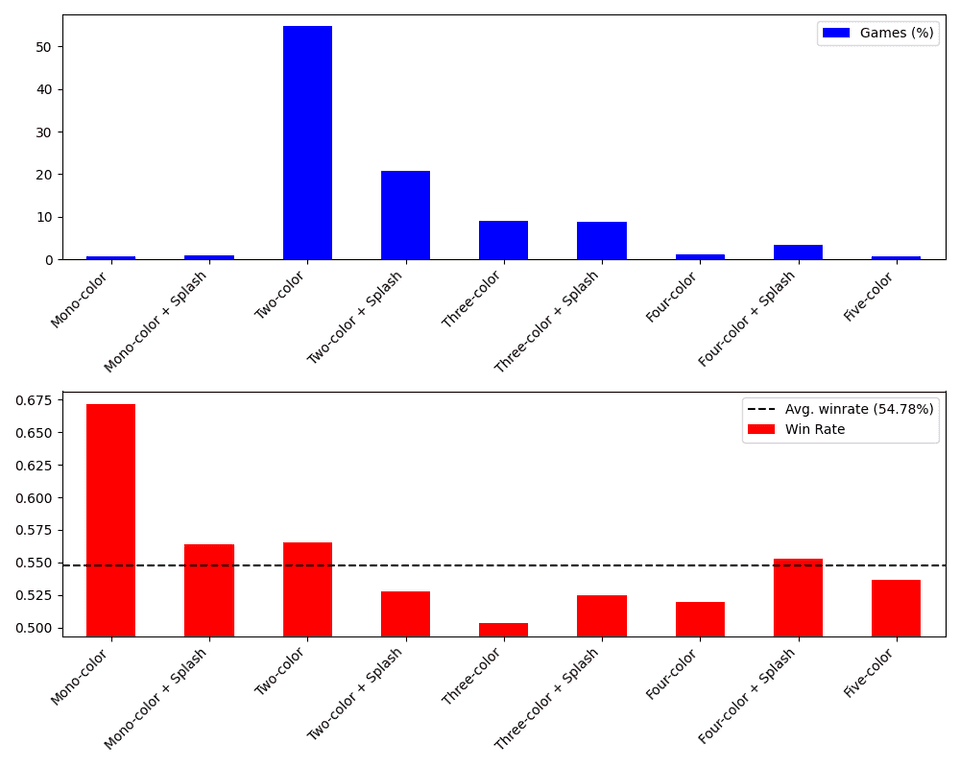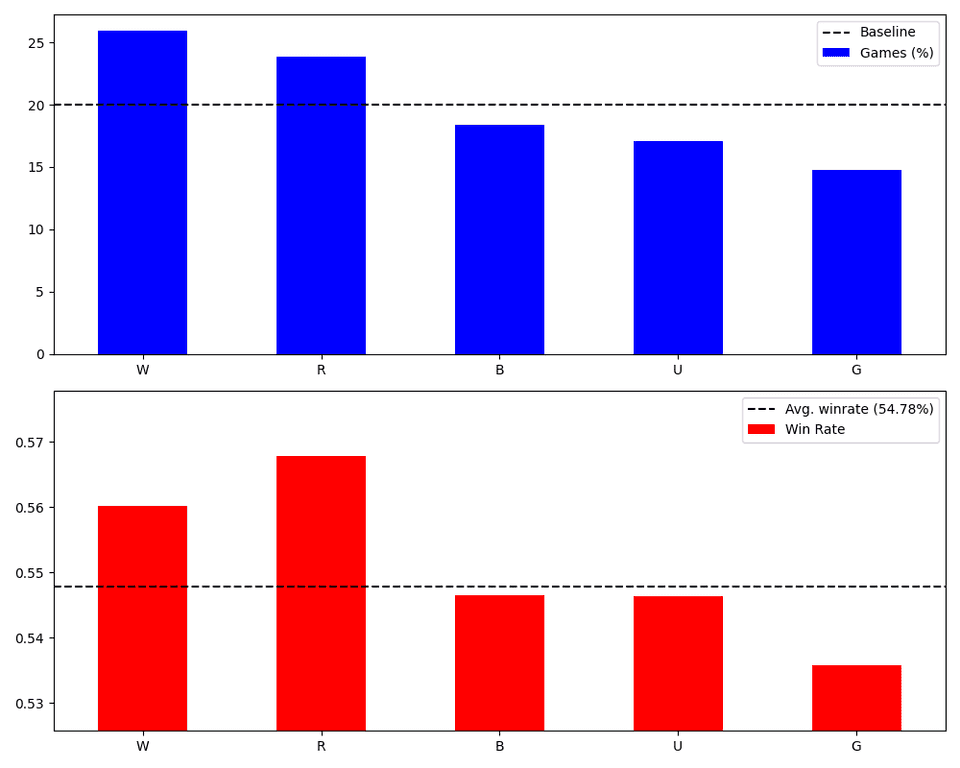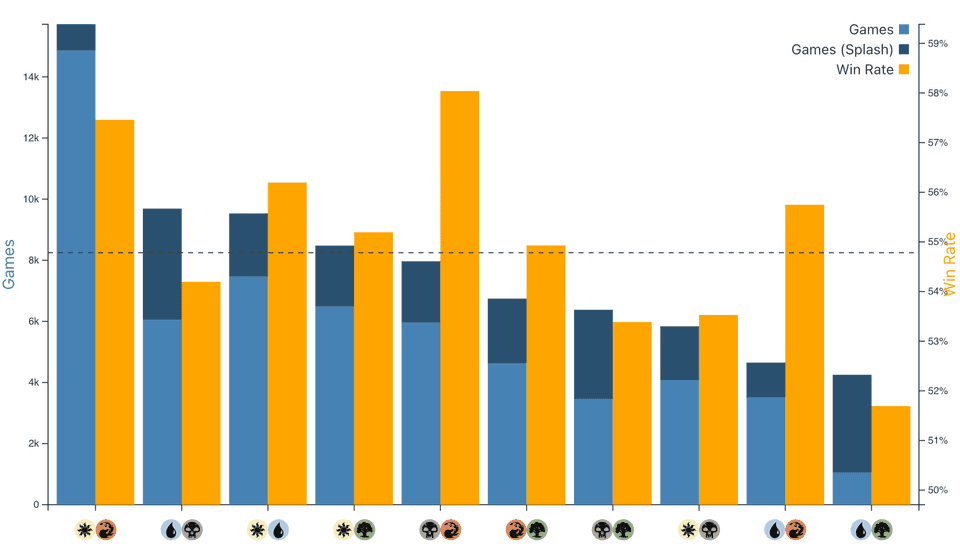Breaking Down Pioneer Masters: Best Decks and Top Performing Cards
The first week of Pioneer Masters is done and 17Lands collected enough data to look at the format in more detail and figure out what’s going on.
In total there were 100,000 Premier Draft games tracked in the first week, which is considerably less than usual for a new format. For comparison, you can look at the following table where the number of week 1 games for all sets released in 2024 is listed:
| Set Name | Week 1 Games (Premier) | Week 1 Games (Traditional) |
|---|---|---|
| Pioneer Masters | 105,057 | 15,351 |
| Foundations | 295,101 | 39,686 |
| Duskmourn | 301,877 | 53,319 |
| Bloomburrow | 330,118 | 28,592 |
| Modern Horizons 3 | 264,567 | 53,319 |
| Outlaws of Thunder Junction | 329,189 | 51,815 |
| Murders at Karlov Manor | 269,395 | 42,341 |
Since Pioneer Masters is an Arena-only reprint set, it’s not surprising that interest is lower compared to a new set release. Just keep in mind that the size of the dataset is only a third of what we usually have available after the first week.
Color Preferences and Win Rates
Looking at the next graph we can see how many colors are played and how multicolor decks are performing.
Pioneer Masters is clearly a multicolored format, with clean two-color decks making up only 55% of the field (for comparison, Foundations had +70%). This is no surprise since the set prominently features a gates deck, which encourages players to play more colors. Seeing four-color splash and five-color decks achieve strong results is a sign that this archetype is viable and not just a meme.
Digging deeper and looking at the popularity of each color, we see that white and red are not only the most played colors but also the most successful ones. The popularity of those two-colors is mostly attributed to Boros, which makes up around 15% of all games and dominated this first week of the format.
Red currently appears to be the strongest color, boasting a win rate of 56.5% across all decks that include it. Green on the other hand lags behind in terms of popularity as well as win rate. However, as we’ve just seen in Foundations this can easily change in the next couple of weeks.
Archetype Performance
Moving forward we’ll be looking at two-color archetypes since they are the bread and butter of limited Magic. The following chart shows each archetype sorted by popularity and its win rate.
All win rates are relatively close to each other, except for Boros and Rakdos, which stand out as clear leaders, while Simic lags behind. Keep in mind that a pure two-color Simic deck is rather rare, since it often will be the base for a multicolor Gates deck. Because of that the data might be skewed and shouldn’t be taken at face value.
Again we see that all red archetypes perform well and Rakdos and Izzet look like great places to explore right now.
Archetype Breakdown
Now let’s get into the data and explore each archetype in more detail to figure out which cards make them tick and what to look out during the draft. We’ll look at
- top commons and uncommons: based on win rate within the archetype
- undervalued cards: cards with high win rate and high ALSA
- overvalued cards: cards with low win rate and low ALSA
- secret gold cards: monocolored cards that perform better in this archetype than in others
- trap cards: cards that perform worse in this archetype than in others
Rakdos
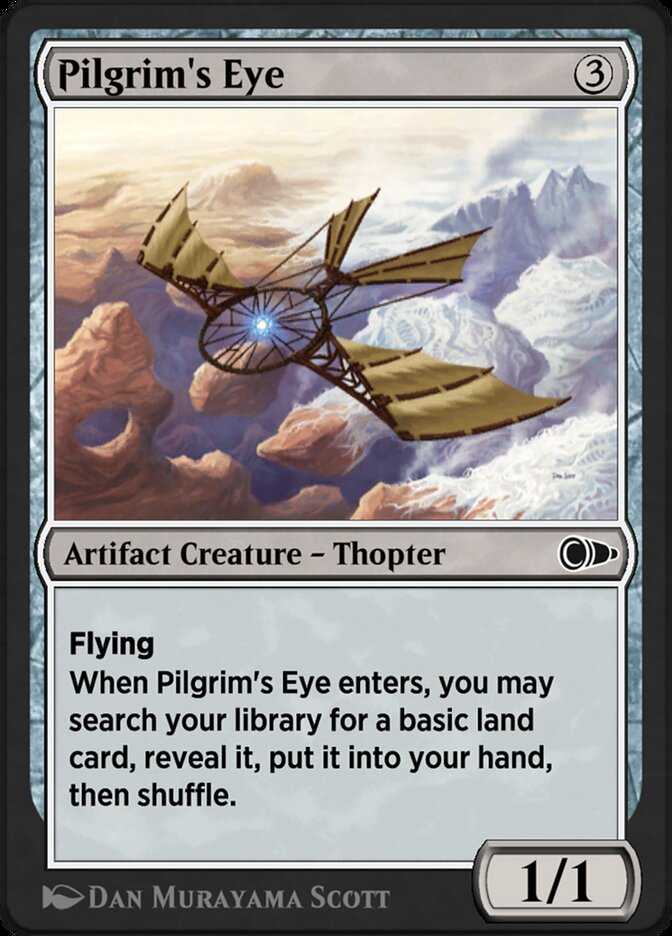
Surprisingly, the strongest common — even surpassing every uncommon — in the top archetype is not an efficient removal spell or powerful creatures but a small little flier: Pilgrim's Eye.
Rakdos is aggressive and tries to go wide, with many of its best cards being small creatures that create tokens. Pilgrim's Eye fits into this theme, as it is evasive, adds you a land and supports the small artifact theme with cards like Thopter Engineer or Pia and Kiran Nalaar.
| Rakdos Commons | Win Rate |
|---|---|
| Pilgrim's Eye | 65.47% |
| Akroan Crusader | 63.44% |
| Ghirapur Gearcrafter | 62.39% |
| Dreadbore | 61.84% |
| Dragon Mantle | 61.68% |
In the top uncommons we see two efficient removal spells, Ultimate Price and Draconic Roar. Together with Dreadbore, Rakdos has access to premium two-mana removal to deal with early threats.
| Rakdos Uncommons | Win Rate |
|---|---|
| Bloodtithe Harvester | 64.38% |
| Thopter Engineer | 63.72% |
| Ultimate Price | 62.68% |
| Nighthowler | 62.56% |
| Draconic Roar | 62.3% |
Undervalued and Overvalued Cards
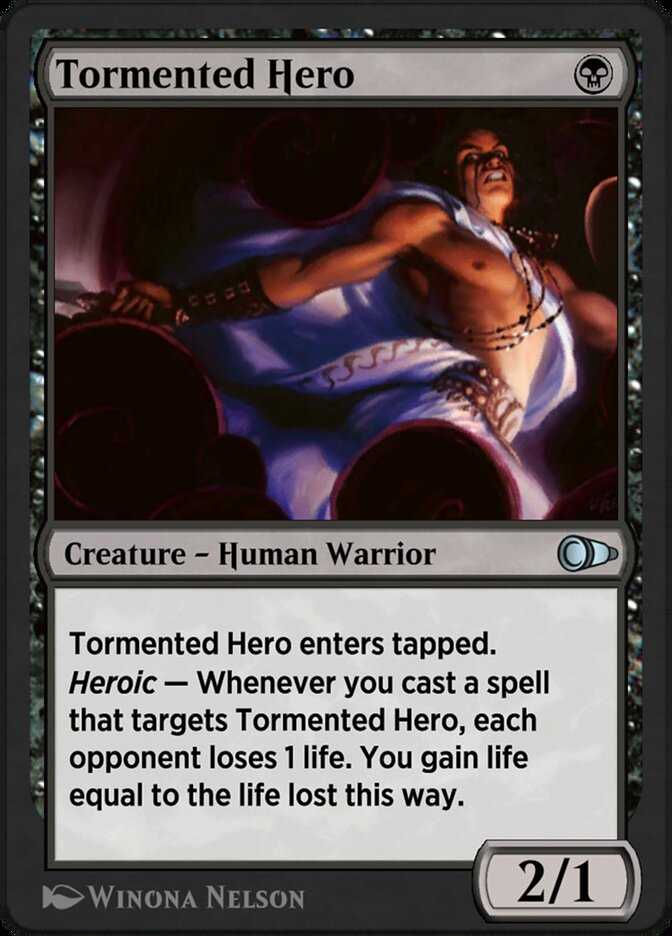
The undervalued cards further illustrate Rakdos's game plan and strengths. Two of them are one-drops with heroic triggers, Tormented Hero and Akroan Crusader and two are ways to trigger them Dragon Mantle and Supernatural Stamina.
| Rakdos Undervalued | Win Rate | ALSA |
|---|---|---|
| Tormented Hero | 60.19% | 7.68 |
| Valakut Awakening | 62.19% | 7.05 |
| Supernatural Stamina | 58.51% | 8.06 |
| Dragon Mantle | 61.68% | 7.05 |
| Akroan Crusader | 63.44% | 6.5 |
On the other side, expensive removal spells like Stab Wound and Cruel Revival underdeliver compared to expectations. Fall of the Hammer is also not performing as well as it might seem at first glance, because creatures are too small.
Ordeal of Purphoros is the most overrated card for Rakdos and has a win rate 6% below average. While we saw that cheap heroic creatures are good, the deck doesn’t deal enough about this theme to play an aura like that.
| Rakdos Overvalued | Win Rate | ALSA |
|---|---|---|
| Ordeal of Purphoros | 51.99% | 4.29 |
| Scab-Clan Berserker | 51.83% | 5.14 |
| Stab Wound | 55.45% | 4.42 |
| Cruel Revival | 54.63% | 4.98 |
| Fall of the Hammer | 54.51% | 5.35 |
Secret Gold and Trap Cards
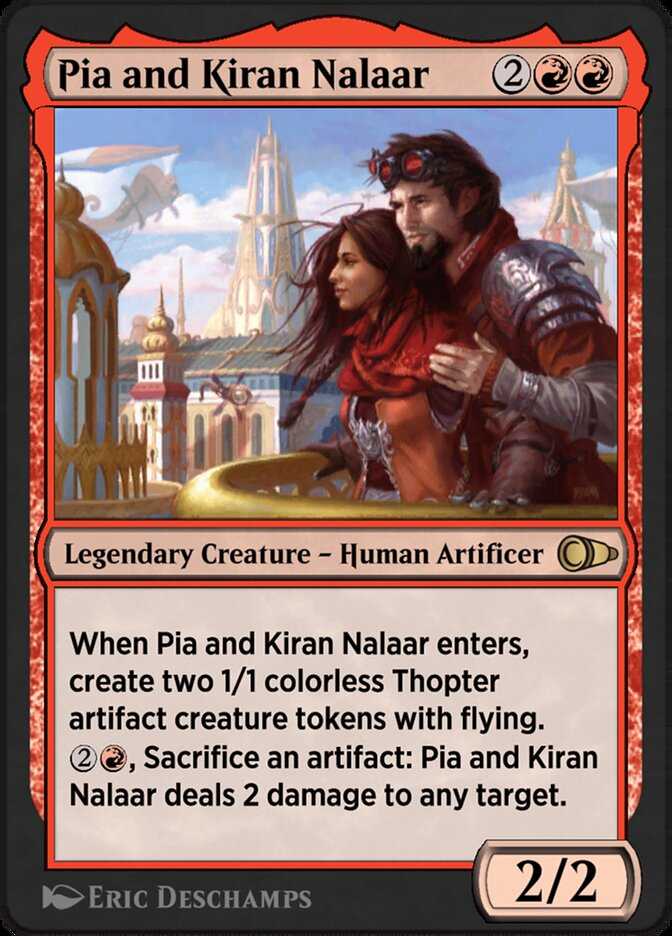
Most of the secret gold cards we've already seen in the previous tables. The only new one is a rare, Pia and Kiran Nalaar, which is an absolute powerhouse in Rakdos with a win rate of 71.3%.
| Secret Gold Cards | Win Rate | Rakdos Win Rate |
|---|---|---|
| Valakut Awakening | 53.9% (-2.68%) | 62.19% (3.53%) |
| Pia and Kiran Nalaar | 63.22% (6.64%) | 71.3% (12.64%) |
| Pilgrim's Eye | 57.36% (2.61%) | 65.47% (6.82%) |
| Akroan Crusader | 57.68% (1.1%) | 63.44% (4.79%) |
| Thopter Engineer | 58.42% (1.84%) | 63.72% (5.06%) |
When it comes to trap cards, Cruel Revival stands out as the most prominent example. While in general it improves the win rate of a deck, in Rakdos it is performing 4% below average.
| Trap Cards | Win Rate | Rakdos Win Rate |
|---|---|---|
| Cruel Revival | 55.83% (1.08%) | 54.63% (-4.03%) |
| Purphoros's Emissary | 49.69% (-6.89%) | 47.68% (-10.97%) |
| Fall of the Hammer | 55.89% (-0.7%) | 54.51% (-4.15%) |
| Ordeal of Purphoros | 53.42% (-3.16%) | 51.99% (-6.67%) |
| Scab-Clan Berserker | 53.27% (-3.31%) | 51.83% (-6.83%) |
Boros
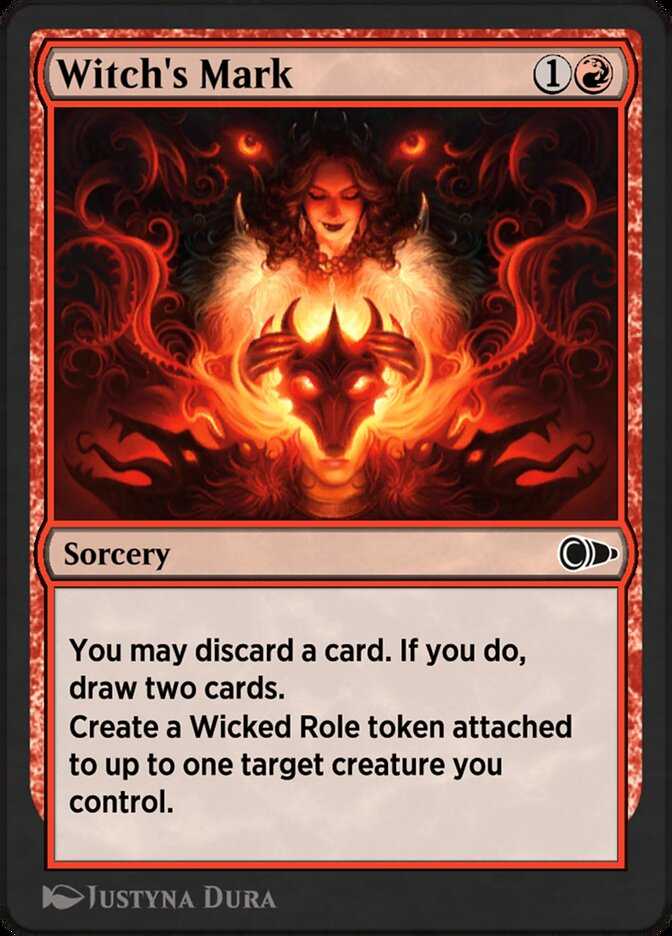
Continuing with the next red archetype, Boros, we see that this is the heroic deck. The best performing common is Witch's Mark, which outperforms even the best uncommons.
Rimrock Knight is another excellent way to trigger heroic while also providing an aggressive body.
| Boros Commons | Win Rate |
|---|---|
| Witch's Mark | 60.61% |
| Goblin Heelcutter | 59.77% |
| Rimrock Knight | 59.54% |
| Heliod's Pilgrim | 58.14% |
| Ghirapur Gearcrafter | 58.12% |
While technically not heroic, Monastery Swiftspear is another great card for Boros that is impossible to block as a blowout is basically guaranteed.
The other two of the top 3 uncommons are Tenth District Legionnaire and Anax and Cymede, which are both premium heroic payoffs.
| Boros Uncommons | Win Rate |
|---|---|
| Monastery Swiftspear | 60.15% |
| Tenth District Legionnaire | 59.99% |
| Anax and Cymede | 59.59% |
| Thopter Engineer | 58.6% |
| Imposing Sovereign | 58.38% |
Undervalued and Overvalued Cards
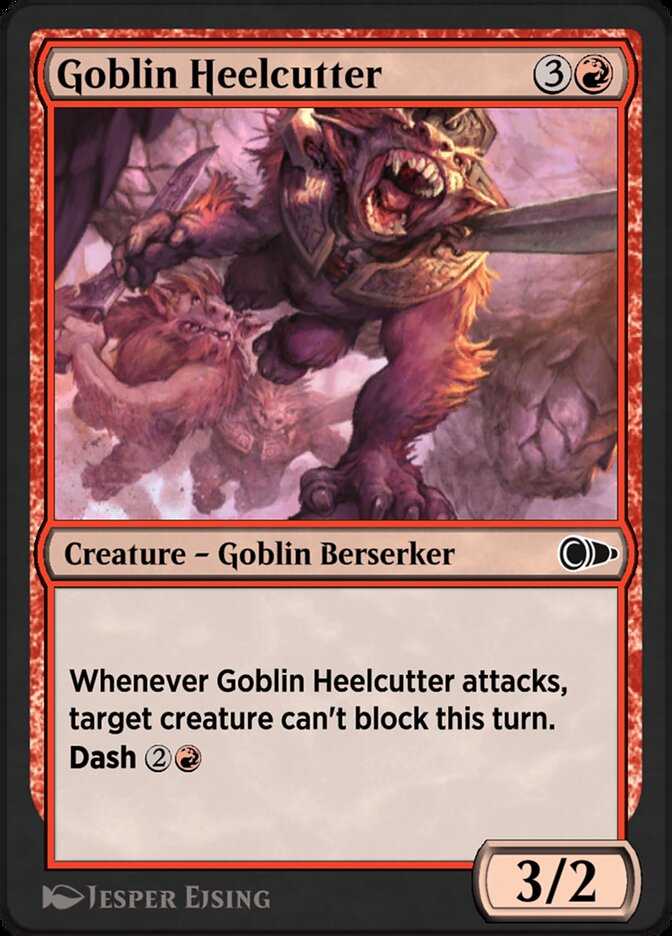
To highlight in the undervalued cards, we see Goblin Heelcutter which is great in enabling surprising attacks when the opponent thinks they stabilized.
Besides that we see another can trip enabler for heroic in Dragon Mantle and Heliod's Pilgrim which can fetch it.
| Boros Undervalued | Win Rate | ALSA |
|---|---|---|
| Witch's Mark | 60.61% | 6.81 |
| Makindi Sliderunner | 57.89% | 7.64 |
| Goblin Heelcutter | 59.77% | 6.73 |
| Dragon Mantle | 57.91% | 7.05 |
| Heliod's Pilgrim | 58.14% | 6.4 |
The clear message from the overvalued cards is that Boros is not interested in removal. Instead of spending three mana to cast Fight with Fire you should dash a Goblin Heelcutter make their biggest creature unable to block and push more damage.
| Boros Overvalued | Win Rate | ALSA |
|---|---|---|
| Fight with Fire | 52.41% | 3.17 |
| Mentor of the Meek | 52.0% | 3.64 |
| War Oracle | 48.53% | 5.38 |
| Stasis Snare | 55.33% | 2.89 |
| Silkwrap | 54.81% | 3.47 |
Secret Gold and Trap Cards
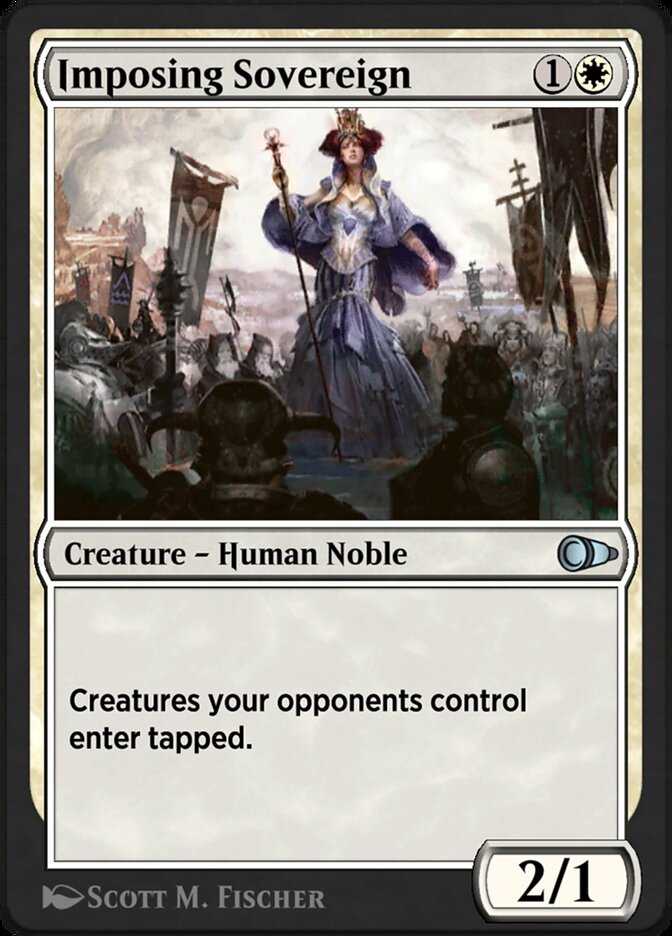
Speaking of ways to deal with opposing creatures while adding to the board: Imposing Sovereign is one of the secret gold cards for Boros. Delaying opponents blocker for one turn might be enough to push through the last points of damage.
| Secret Gold Cards | Win Rate | Boros Win Rate |
|---|---|---|
| Monastery Swiftspear | 58.47% (1.89%) | 60.15% (2.63%) |
| Imposing Sovereign | 56.21% (0.32%) | 58.38% (0.86%) |
| Rimrock Knight | 58.06% (1.48%) | 59.54% (2.02%) |
| Heliod's Pilgrim | 56.04% (0.16%) | 58.14% (0.62%) |
| Witch's Mark | 59.29% (2.71%) | 60.61% (3.09%) |
As for traps, we see a bunch more removal spells that are not performing well in Boros.
Interestingly we also see Valakut Awakening which was a secret gold card for Rakdos as a trap in Boros, even though both appear to be very aggressive.
| Trap Cards | Win Rate | Boros Win Rate |
|---|---|---|
| Oath of Chandra | 55.03% (-1.55%) | 50.3% (-7.22%) |
| Fight with Fire | 56.91% (0.33%) | 52.41% (-5.11%) |
| Swift Reckoning | 53.13% (-2.75%) | 50.0% (-7.52%) |
| Valakut Awakening | 53.9% (-2.68%) | 50.19% (-7.33%) |
| Sungrace Pegasus | 53.14% (-2.74%) | 50.3% (-7.22%) |
Azorius
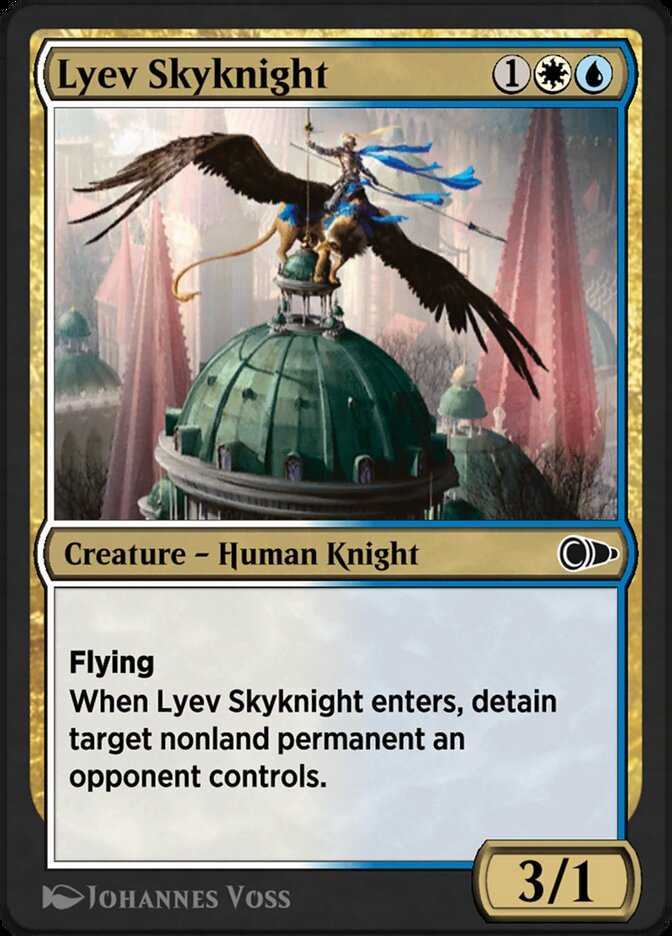
The top commons and uncommons in white/blue summarize the archetypes strategy well, sticking a couple of flyers early and then tempoing out the opponent with bounce spells.
Lyev Skyknight is doing both, providing a very aggressive evasive body and temporarily neutralizing an opposing creature, which makes it the top common.
| Azorius Commons | Win Rate |
|---|---|
| Lyev Skyknight | 59.92% |
| Cloudfin Raptor | 59.8% |
| Gust of Wind | 59.49% |
| Pilgrim's Eye | 59.18% |
| Fallaji Archaeologist | 58.82% |
On the uncommon side, the best performing card is actually a card draw spell, Sight Beyond Sight. This four-mana sorcery lets you draw the best card from the top two cards twice, digging deeper to find more flyers or removal.
| Azorius Uncommons | Win Rate |
|---|---|
| Sight Beyond Sight | 61.77% |
| Thunderclap Wyvern | 61.35% |
| Kabira Takedown | 60.62% |
| Anchor to the Aether | 60.15% |
| Steward of Solidarity | 60.06% |
Undervalued and Overvalued Cards
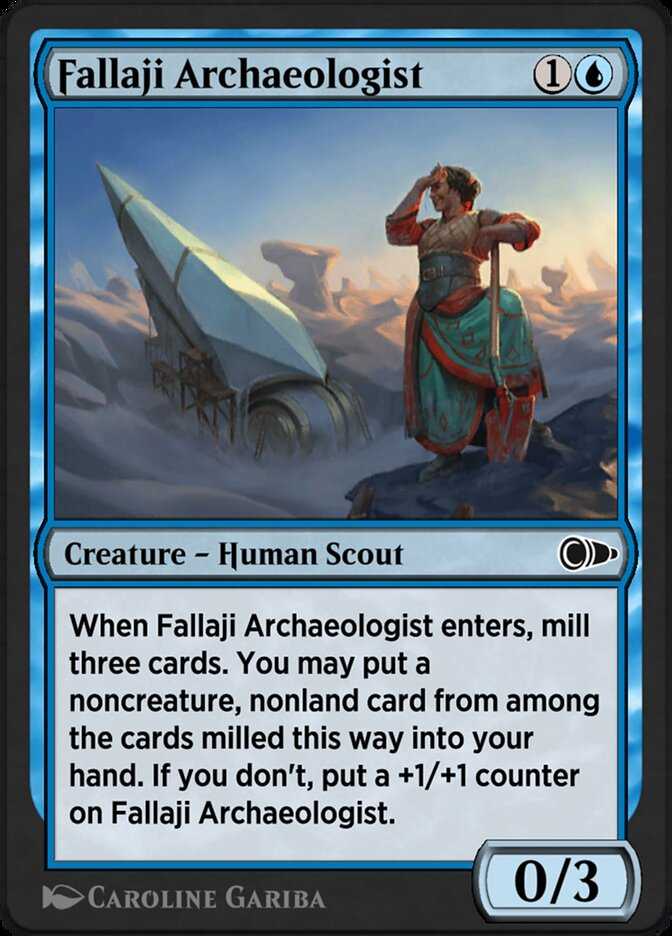
As you can see, Sight Beyond Sight is clearly flying under the radar of most players right now with an insanly high ALSA of 7.18.
The card I want to draw attention to here however is Fallaji Archaeologist. It is the fifth-best common in the archetype and should be fairly easy to pick up late in the draft. Although it is not a flyer, it does a lot of work in the deck by providing card advantage, a fairly big body to gum up the ground and a way to grow your Cloudfin Raptor a second time.
| Azorius Undervalued | Win Rate | ALSA |
|---|---|---|
| Sight Beyond Sight | 61.77% | 7.18 |
| Fallaji Archaeologist | 58.82% | 7.26 |
| Lyev Skyknight | 59.92% | 6.3 |
| Gust of Wind | 59.49% | 6.27 |
| Keening Apparition | 56.93% | 7.07 |
For the overvalued cards we see Mentor of the Meek as the top contender. Players pick it very highly, but its performance overall is quite miserable (except maybe in Orzhov). The problem with it is that a 2/2 for three mana that doesn't provide any immediate benefit is not where you want to be in modern limited Magic.
| Azorius Overvalued | Win Rate | ALSA |
|---|---|---|
| Mentor of the Meek | 52.96% | 3.61 |
| Phalanx Leader | 53.29% | 3.52 |
| Hopeful Eidolon | 53.56% | 3.93 |
| Jhessian Thief | 52.09% | 4.67 |
| Silkwrap | 55.87% | 3.46 |
Secret Gold and Trap Cards
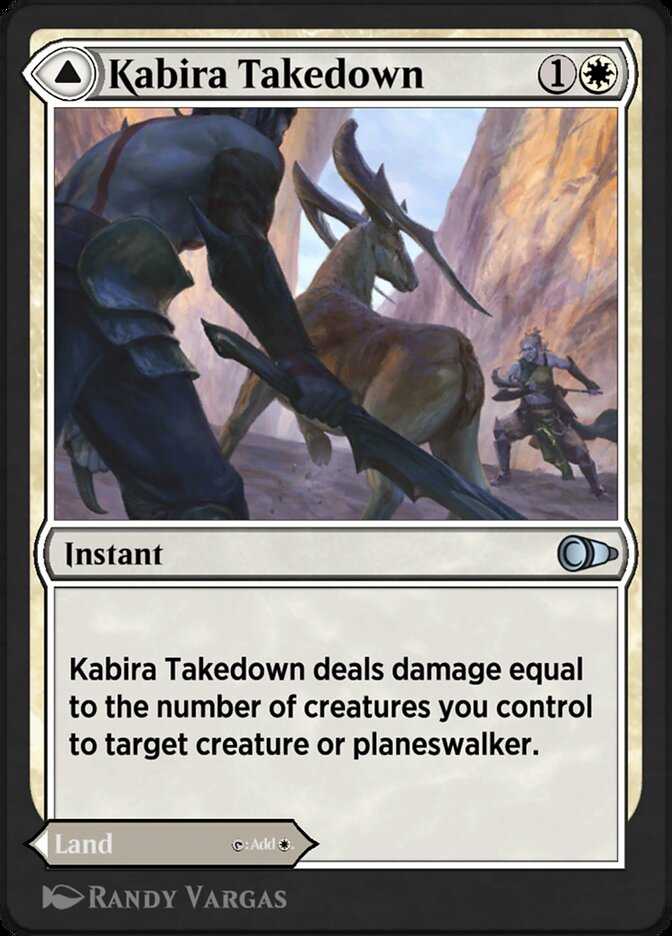
Azorius is trying to play a wide enough board to make Kabira Takedown an efficient removal spell. In White/Blue it performs 4% better than average, while having a negative impact on white decks in general.
Sungrace Pegasus is the another secret gold card that no other deck should be interested in playing.
| Secret Gold Cards | Win Rate | Azorius Win Rate |
|---|---|---|
| Kabira Takedown | 54.97% (-1.05%) | 60.62% (3.77%) |
| Sungrace Pegasus | 53.61% (-2.41%) | 57.52% (0.66%) |
| Sight Beyond Sight | 56.83% (2.19%) | 61.77% (4.92%) |
| Illusory Angel | 54.55% (-0.08%) | 59.25% (2.39%) |
| Keening Apparition | 53.85% (-2.17%) | 56.93% (0.08%) |
In the trap cards we see Jwari Disruption and Scatter to the Winds, two counter spells, both performing poorly in Azorius. Leaving mana open to counter your opponent's spell is not where you want to be in this tempo deck.
| Trap Cards | Win Rate | Azorius Win Rate |
|---|---|---|
| Lotus-Eye Mystics | 51.27% (-4.75%) | 45.29% (-11.57%) |
| Jwari Disruption | 55.78% (1.14%) | 54.27% (-2.58%) |
| Scatter to the Winds | 55.72% (1.08%) | 54.49% (-2.36%) |
| Jhessian Thief | 52.46% (-2.18%) | 52.09% (-4.76%) |
| Phalanx Leader | 54.9% (-1.12%) | 53.29% (-3.56%) |
Izzet
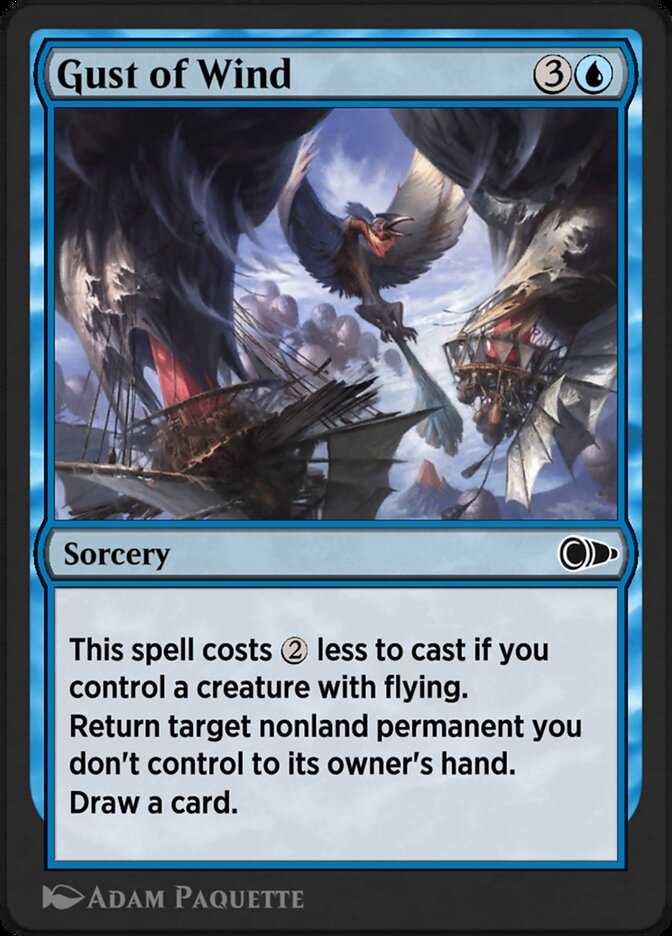
Given Blue/Red’s poor performance in the last couple of sets, it is surprising to see it in the better performing archetypes in Pioneer Masters. The decks theme seems to be a spells-matter midrange deck with some heavy-hitting four-drops.
First thing to notice is the absurdly high win rate of Goblin Heelcutter, 66.6% is a number you don’t see often in a common four-drop. With an ALSA of 6.73 it is also undervalued by most players, and it should be easy to pick up late in the draft. The flexibility of dashing it in for 3 mana makes me think that you’re also happy playing multiples of it.
Gust of Wind is the second best performing common in Izzet. It is probably less often discounted than in White/Blue, but even for full prize the flexibility of bouncing any nonland and can-tripping is worth it.
| Izzet Commons | Win Rate |
|---|---|
| Goblin Heelcutter | 66.6% |
| Gust of Wind | 61.39% |
| Witch's Mark | 60.33% |
| Ghirapur Gearcrafter | 60.12% |
| Wild Slash | 60.05% |
For uncommons the clear winner is Anchor to the Aether. Recently we've seen this kind of effect being very strong also at 4 mana. This card is sorcery-speed, which definitely makes it worse, but at only three mana and not letting opponent choose to bottom the card it surely makes up for that.
Comparing win rates of the two tables we see that the win rate of uncommons drops off significantly, while the commons maintain a high level. This suggests that a strong Izzet deck can be built primarily from commons.
| Izzet Uncommons | Win Rate |
|---|---|
| Anchor to the Aether | 63.27% |
| Jwari Disruption | 61.08% |
| Fight with Fire | 60.37% |
| Stormchaser Mage | 60.2% |
| Zephyr Winder | 58.48% |
Undervalued and Overvalued Cards
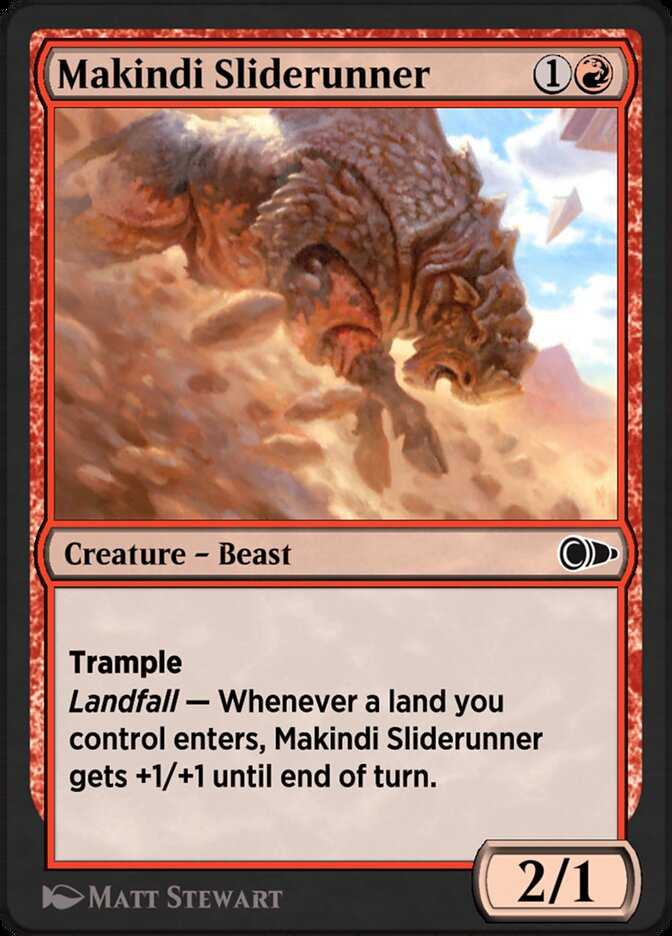
Makindi Sliderunner does not look like the typical Izzet card and most Blue/Red decks won't be able to trigger landfall more than once per turn. However, looking at it as mostly a 3/2 trampler for two mana is something any aggressively slanted deck should be happy to play and that's what Izzet is trying to do.
Another card to shout out is Nivix Cyclops, which currently has the second highest ALSA in the format. While its win rate is nothing to write home about, it is definitely not embarrassing to play. When this beats down as a 4/4 on turn four after bouncing a blocker, it creates a very hard position to recover from.
| Izzet Undervalued | Win Rate | ALSA |
|---|---|---|
| Goblin Heelcutter | 66.6% | 6.67 |
| Nivix Cyclops | 56.61% | 9.47 |
| Bloodfire Enforcers | 58.29% | 8.51 |
| Makindi Sliderunner | 58.95% | 7.6 |
| Stormchaser Mage | 60.2% | 7 |
Illusory Angel ranks highest among overvalued cards. Its casting restriction makes it particularly weak in certain situations like top-decking it late in the game, that it probably won't make up the times when you Consider and cast it on turn 4.
Monastery Swiftspear is also not where Izzet wants to be in this environment. While at first glance it looks like a great aggressive card that cares about spells, the successful builds of Izzet probably run too many creatures in order to make this work.
| Izzet Overvalued | Win Rate | ALSA |
|---|---|---|
| Illusory Angel | 50.65% | 5.29 |
| Jhessian Thief | 52.36% | 4.67 |
| Monastery Swiftspear | 53.8% | 5.24 |
| Essence Scatter | 53.82% | 5.32 |
| Rimrock Knight | 54.19% | 5.54 |
Secret Gold and Trap Cards
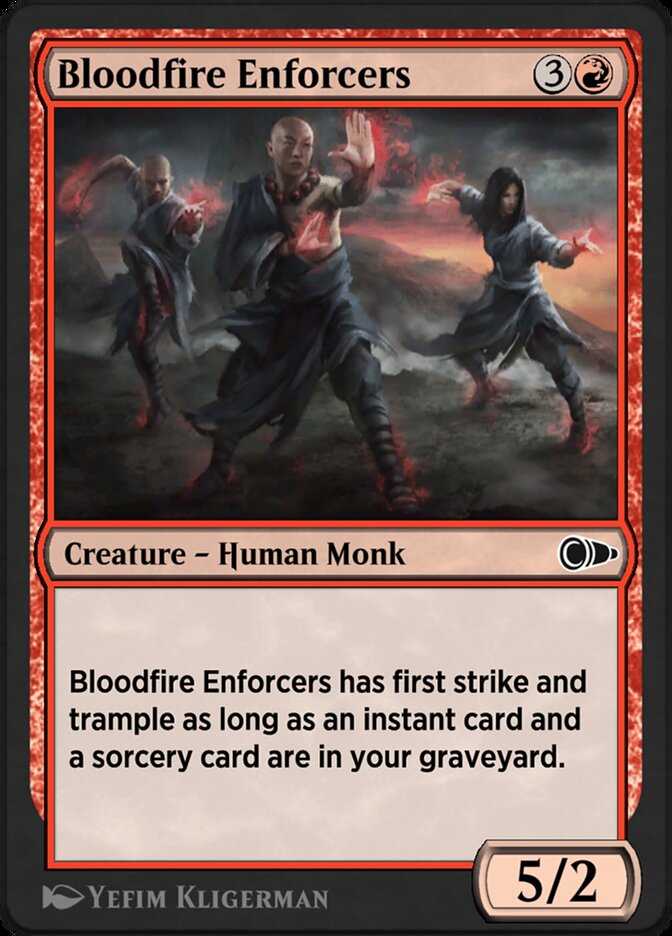
Bloodfire Enforcers require a little bit of building around, but once you can consistently meet its requirements it is an absolute powerhouse.
The other cards are not that surprising, this is the deck to play all the red burn spells and Jwari Disruption is also doing work.
| Secret Gold Cards | Win Rate | Izzet Win Rate |
|---|---|---|
| Goblin Heelcutter | 59.39% (2.62%) | 66.6% (9.27%) |
| Bloodfire Enforcers | 52.14% (-4.63%) | 58.29% (0.97%) |
| Fight with Fire | 56.8% (0.03%) | 60.37% (3.04%) |
| Jwari Disruption | 55.78% (1.14%) | 61.08% (3.75%) |
| Wild Slash | 57.5% (0.72%) | 60.05% (2.72%) |
As for traps, most of them were already mentioned in the overvalued cards. The only new one is Essence Scatter, which probably faces the same problem as the other counterspells in Azorius, that you don't have good ways to spend your mana on your opponents turn if you decide not to use it.
| Trap Cards | Win Rate | Izzet Win Rate |
|---|---|---|
| Illusory Angel | 54.55% (-0.08%) | 50.65% (-6.67%) |
| Monastery Swiftspear | 58.93% (2.15%) | 53.8% (-3.53%) |
| Essence Scatter | 55.92% (1.29%) | 53.82% (-3.51%) |
| Rimrock Knight | 58.44% (1.67%) | 54.19% (-3.14%) |
| Dragon Mantle | 57.34% (0.56%) | 53.55% (-3.78%) |
Selesnya
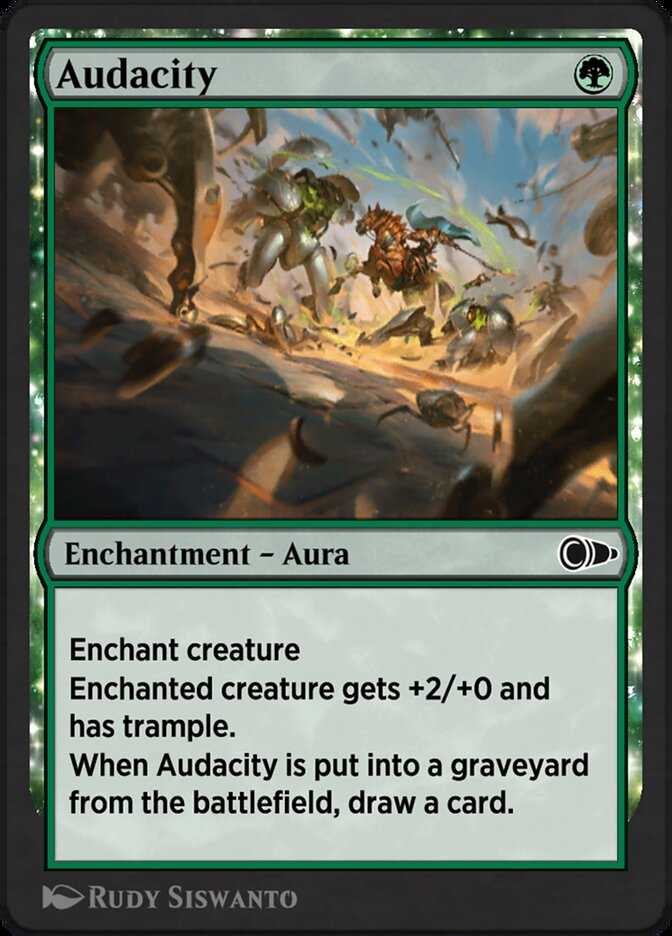
Next we come to the first green deck and only one to make it to the better half of the archetypes, Selesnya. This archetype is all-in on heroic and aura enchantments, so it is no surprise that the best performing common is Audacity, a one-mana aura with relevant stats that eventually replaces itself.
| Selesnya Commons | Win Rate |
|---|---|
| Audacity | 58.72% |
| Leafcrown Dryad | 58.31% |
| Heliod's Pilgrim | 57.77% |
| Hero of Iroas | 57.58% |
| Gnarlback Rhino | 57.55% |
In the top uncommons we see two sign-post uncommons, Loxodon Smiter and Unflinching Courage.
Also Imposing Sovereign is showing up again, after being a secret gold card for Boros, showing that delaying blockers for a turn is also quite relevant here.
| Selesnya Uncommons | Win Rate |
|---|---|
| Loxodon Smiter | 59.77% |
| Boon Satyr | 59.27% |
| Unflinching Courage | 59.26% |
| Stasis Snare | 58.03% |
| Imposing Sovereign | 57.25% |
Undervalued and Overvalued Cards
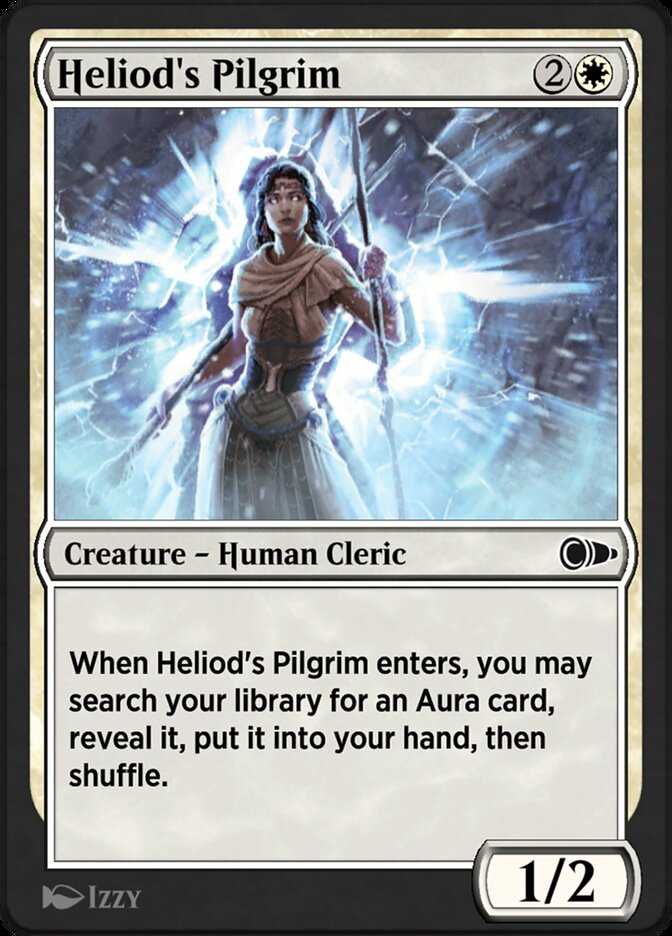
Heliod's Pilgrim and Leafcrown Dryad are both in the top 3 performing commons and go pretty late in the draft.
Another card to look out for is Selesnya Charm, which offers a ton of flexibility and is a great way to trigger heroic.
| Selesnya Undervalued | Win Rate | ALSA |
|---|---|---|
| Heliod's Pilgrim | 57.77% | 6.42 |
| Audacity | 58.72% | 6 |
| Leafcrown Dryad | 58.31% | 6.11 |
| Loxodon Smiter | 59.77% | 4.95 |
| Selesnya Charm | 56.23% | 6.3 |
Since discussing the problem of Mentor of the Meek previously the next most overvalued card is Seed Guardian. This card and Nemesis of Mortals care about creatures in your graveyard and therefore adds nothing to Selesnya's game plan.
Celestial Archon, while technically on theme with what Selesnya wants to do, is just too expensive for what it does. Its win rate however is only slightly below average, so it is not a complete disaster to play it.
| Selesnya Overvalued | Win Rate | ALSA |
|---|---|---|
| Mentor of the Meek | 51.25% | 3.61 |
| Seed Guardian | 50.86% | 4.71 |
| Celestial Archon | 55.04% | 3.16 |
| Silkwrap | 54.46% | 3.46 |
| Nemesis of Mortals | 46.26% | 6.77 |
Secret Gold and Trap Cards
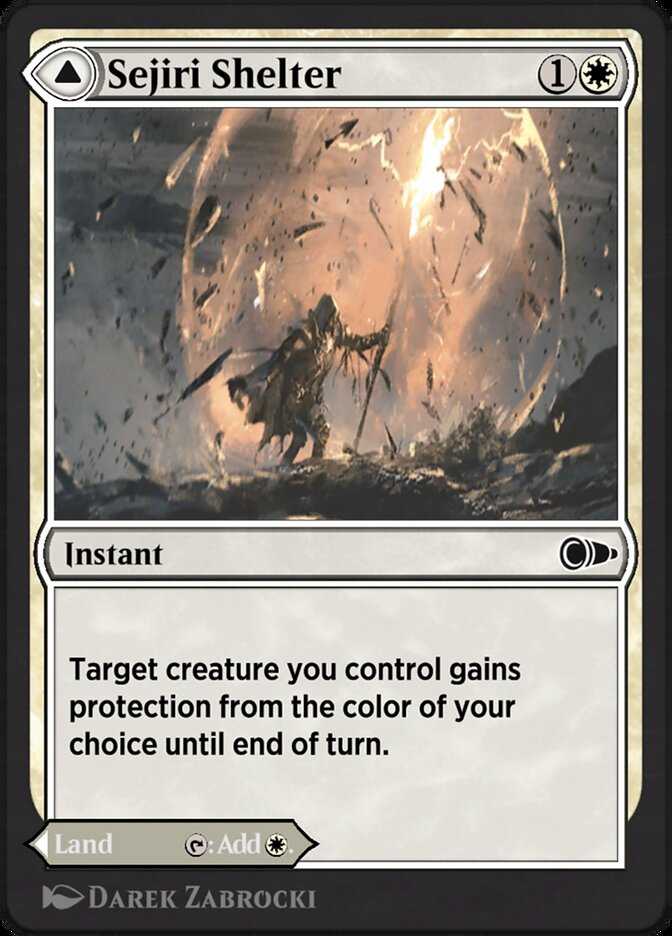
While this is for sure the best home for a card like Phalanx Leader, I want to highlight Sejiri Shelter for protecting your big enchanted creature. Paying two mana for this effect hurts, but the added flexibility of being a land brings it up to a card you're happy to play.
| Secret Gold Cards | Win Rate | Selesnya Win Rate |
|---|---|---|
| Phalanx Leader | 54.9% (-1.12%) | 56.88% (0.97%) |
| Sejiri Shelter | 55.33% (-0.7%) | 57.05% (1.14%) |
| Heliod's Pilgrim | 56.11% (0.09%) | 57.77% (1.86%) |
| Leafcrown Dryad | 54.39% (0.82%) | 58.31% (2.4%) |
| Hero of Iroas | 56.29% (0.27%) | 57.58% (1.67%) |
On the trap card side we see Conclave Naturalists showing up, which has a significantly worse win rate in Selesnya than in other green decks. This is probably because Selesnya is a very synergy driven deck a five mana 4/4 is just not enough to win games.
| Trap Cards | Win Rate | Selesnya Win Rate |
|---|---|---|
| Seed Guardian | 55.02% (1.45%) | 50.86% (-5.05%) |
| Conclave Naturalists | 55.8% (2.23%) | 51.8% (-4.11%) |
| Nemesis of Mortals | 50.04% (-3.53%) | 46.26% (-9.65%) |
| Syndicate Messenger | 53.85% (-2.17%) | 47.99% (-7.92%) |
| Honored Hydra | 55.09% (1.52%) | 53.01% (-2.9%) |
Gruul

Red/Green is the last archetype we’ll look at with an above average win rate and the worst red deck in the format.
Just looking at the win rates of the two tables below, we can see that it depends more on the uncommons than what we've seen before. The best common is Gnarlback Rhino, which can be a great card when build around it a little bit.
District Guide showing up here hints that Red/Green will often be a shell for the gates deck. Therefore, looking just at pure Gruul decks might not be too useful.
| Gruul Commons | Win Rate |
|---|---|
| Gnarlback Rhino | 57.5% |
| Audacity | 57.11% |
| District Guide | 57.03% |
| Fall of the Hammer | 56.88% |
| Wild Slash | 56.76% |
Gruuls theme seems to be power 4 or greater, which is illustrated by its best performing uncommon Goreclaw, Terror of Qal Sisma.
Having a bunch of high-powered creatures of course increases the value of removal spells like Clear Shot or Fall of the Hammer.
| Gruul Uncommons | Win Rate |
|---|---|
| Goreclaw, Terror of Qal Sisma | 60.62% |
| Heart-Piercer Manticore | 60.41% |
| Clear Shot | 60.15% |
| Kraul Harpooner | 59.91% |
| Fight with Fire | 59.69% |
Undervalued and Overvalued Cards
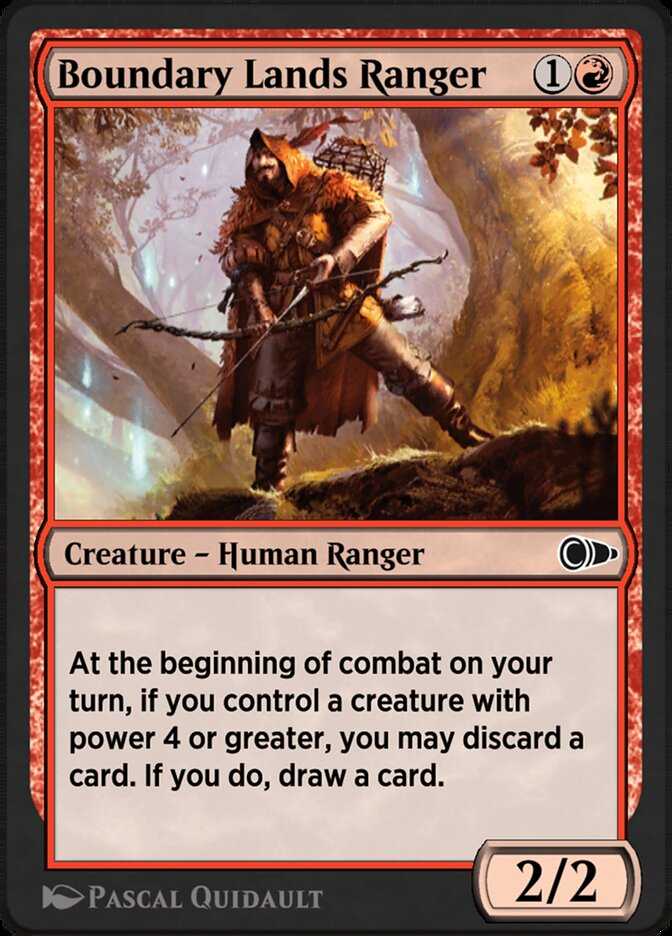
Boundary Lands Ranger is the most underrated card in Gruul right now, when playing it look for opportunities to get value of the discard. For example the card Honored Hydra, a 6/6 trampler for 6, can be embalmed for only 4 mana from the graveyard.
To show the importance of knowing which cards belong in which deck, we see Conclave Naturalists showing up again with an impressive win rate of 58.46% in Gruul, while being a trap in Selesnya.
| Gruul Undervalued | Win Rate | ALSA |
|---|---|---|
| Boundary Lands Ranger | 56.31% | 7.47 |
| Makindi Sliderunner | 55.01% | 7.6 |
| Witch's Mark | 56.38% | 6.75 |
| Conclave Naturalists | 58.46% | 5.7 |
| Heart-Piercer Manticore | 60.41% | 4.59 |
As for overvalued cards there is nothing really interesting to say. Seed Guardian is showing up again, because paying 4 mana and not even getting four power is a recipe for disaster in Gruul.
The highlighted card Coordinated Assault, as well as Hero of Leina Tower are both showing that heroic is not important enough here to justify playing them.
| Gruul Overvalued | Win Rate | ALSA |
|---|---|---|
| Seed Guardian | 49.22% | 4.71 |
| Ordeal of Purphoros | 50.14% | 4.3 |
| Coordinated Assault | 52.55% | 5.48 |
| Hero of Leina Tower | 51.88% | 5.85 |
| Leafcrown Dryad | 51.47% | 6.11 |
Secret Gold and Trap Cards
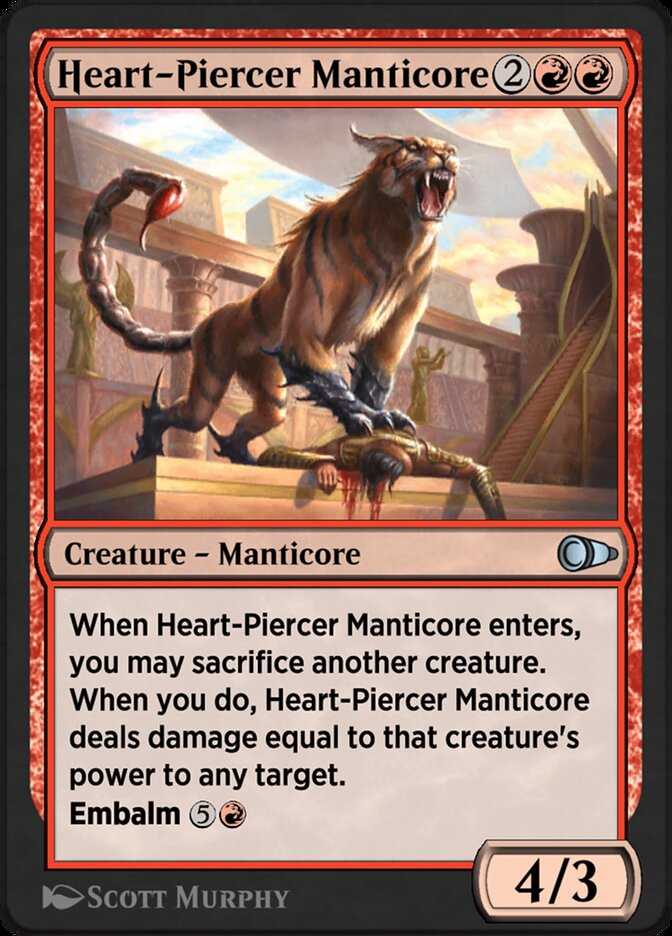
The two embalm creatures Heart-Piercer Manticore and Honored Hydra are best played in Gruul. Heart-Piercer Manticore is providing some reach to kill the opponent when they stabilized the board and Honored Hydra is a big trampler has to be dealt with twice.
| Secret Gold Cards | Win Rate | Gruul Win Rate |
|---|---|---|
| Heart-Piercer Manticore | 57.23% (0.45%) | 60.41% (5.27%) |
| Fight with Fire | 56.8% (0.03%) | 59.69% (4.55%) |
| Honored Hydra | 55.09% (1.52%) | 59.68% (4.55%) |
| Boundary Lands Ranger | 55.11% (-1.66%) | 56.31% (1.17%) |
| Goreclaw, Terror of Qal Sisma | 56.35% (2.78%) | 60.62% (5.49%) |
As example for traps we see Courier's Briefcase. Gruul wants to beat down and paying two mana for a 1/1 does not fit that plan.
| Trap Cards | Win Rate | Gruul Win Rate |
|---|---|---|
| Seed Guardian | 55.02% (1.45%) | 49.22% (-5.91%) |
| Courier's Briefcase | 56.85% (3.28%) | 53.06% (-2.07%) |
| Leafcrown Dryad | 54.39% (0.82%) | 51.47% (-3.67%) |
| Akroan Crusader | 57.73% (0.95%) | 52.45% (-2.68%) |
| Ghirapur Gearcrafter | 58.76% (1.98%) | 54.09% (-1.05%) |
Dimir
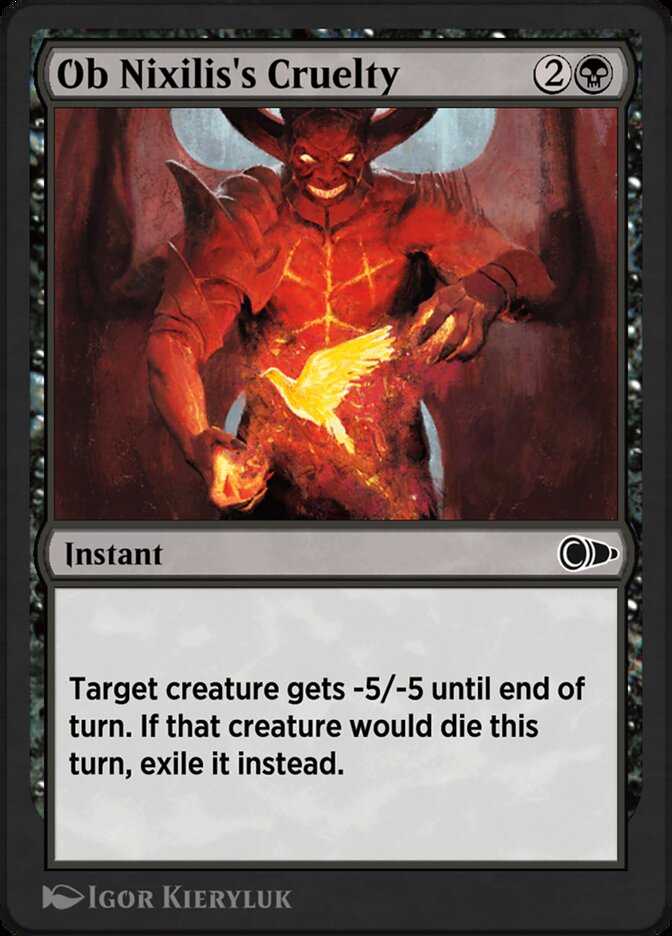
Dimir functions as a typical control deck, featuring ample removal, card draw, and defensive creatures. The best performing common is Ob Nixilis's Cruelty, which is a great removal spell that can deal with most creatures in the format and even exiles them.
But also some flyers like Cloudfin Raptor and Basilica Screecher are showing up in the top 5 commons.
| Dimir Commons | Win Rate |
|---|---|
| Ob Nixilis's Cruelty | 61.59% |
| Gust of Wind | 61.01% |
| Fallaji Archaeologist | 60.67% |
| Cloudfin Raptor | 59.22% |
| Basilica Screecher | 59.18% |
In the uncommons we see a very unique card in Murmuring Mystic, which can be an engine for endless flyers, that can either jump block or just kill the opponent in the air.
Besides that there are more removal spells, as well as Tomebound Lich and Dinrova Horror, two sign-post uncommons of the archetype.
| Dimir Uncommons | Win Rate |
|---|---|
| Ultimate Price | 61.97% |
| Murmuring Mystic | 61.89% |
| Tomebound Lich | 61.07% |
| Anchor to the Aether | 60.81% |
| Dinrova Horror | 60.69% |
Undervalued and Overvalued Cards
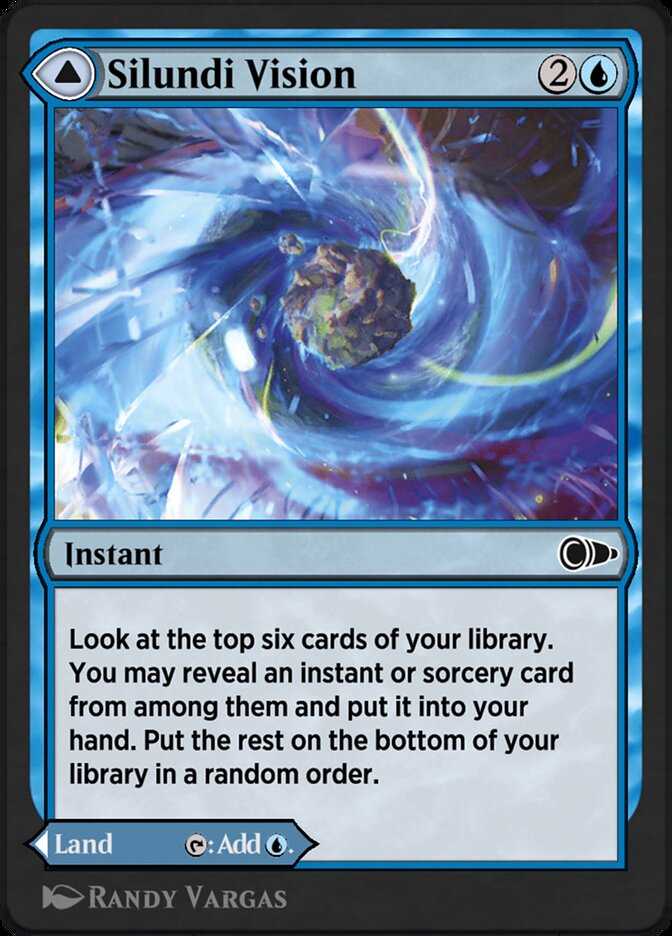
Regarding undervalued cards we see again two blue cards that were already mentioned in Azorius, Sight Beyond Sight and Fallaji Archaeologist.
A new addition for cards to look out for is Silundi Vision, which will help you find the right answers at the right time or as a fallback serve as a land.
| Dimir Undervalued | Win Rate | ALSA |
|---|---|---|
| Fallaji Archaeologist | 60.67% | 7.26 |
| Sight Beyond Sight | 60.22% | 7.18 |
| Silundi Vision | 57.72% | 7.91 |
| Gust of Wind | 61.01% | 6.27 |
| Basilica Screecher | 59.18% | 6.59 |
Leading the overvalued cards we see Stab Wound, which might trick you in playing since a control deck famously wants to play a lot of removal. This one however is most certainly not doing what you want it to do. For three mana you'll most likely trade down in mana when removing a creature and the life drain mode is not relevant in a control deck that wants to stabilize and win the long game.
| Dimir Overvalued | Win Rate | ALSA |
|---|---|---|
| Stab Wound | 50.5% | 4.44 |
| Dreadhound | 51.18% | 5.22 |
| Priest of the Blood Rite | 53.38% | 4.29 |
| Baleful Eidolon | 48.88% | 6.78 |
| Blood Scrivener | 51.93% | 5.56 |
Secret Gold and Trap Cards
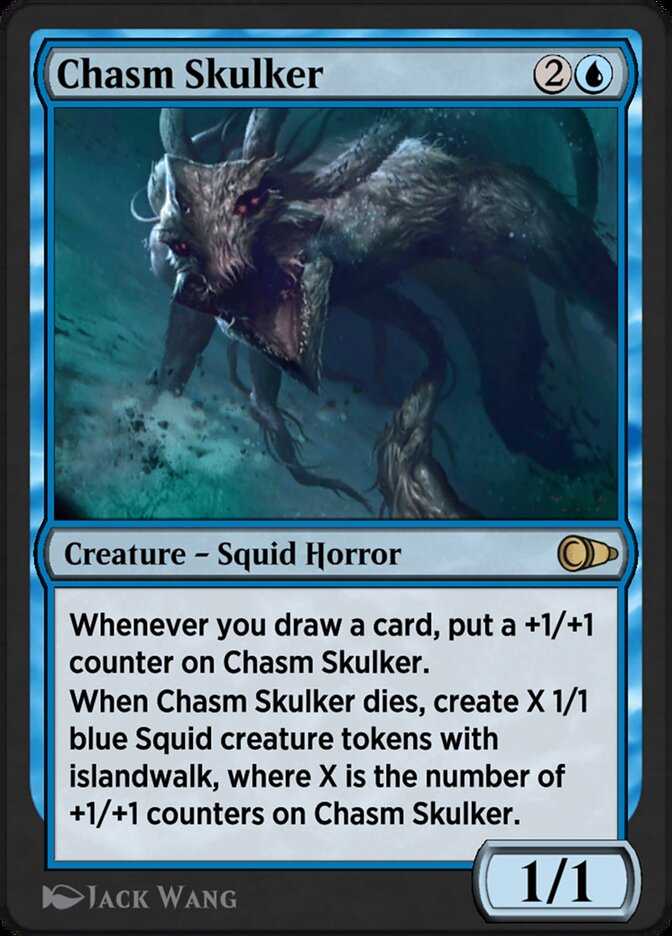
Next to the aforementioned Murmuring Mystic, Chasm Skulker is another secret gold card in Dimir. Of course the possibility of your opponent removing it before it gets its first counter exists, however once it get going it can win the game all by itself.
Scatter to the Winds is also right at home here, offering two modes of a simple cancel in the early and mid-game or a 3/3 body along with it in the late game.
| Secret Gold Cards | Win Rate | Dimir Win Rate |
|---|---|---|
| Chasm Skulker | 54.2% (-0.44%) | 60.0% (5.06%) |
| Murmuring Mystic | 57.53% (2.9%) | 61.89% (6.95%) |
| Scatter to the Winds | 55.72% (1.08%) | 59.27% (4.33%) |
| Evolving Wilds | 54.27% (-0.52%) | 57.5% (2.56%) |
| Sight Beyond Sight | 56.83% (2.19%) | 60.22% (5.28%) |
In Dimir you best avoid cards lile Nantuko Husk and Supernatural Stamina, who ask you to be attacking.
| Trap Cards | Win Rate | Dimir Win Rate |
|---|---|---|
| Nantuko Husk | 55.42% (0.77%) | 49.1% (-5.84%) |
| Supernatural Stamina | 55.24% (0.59%) | 51.49% (-3.45%) |
| Dreadhound | 54.6% (-0.05%) | 51.18% (-3.76%) |
| Baleful Eidolon | 50.43% (-4.23%) | 48.88% (-6.06%) |
| Illusory Angel | 54.55% (-0.08%) | 53.09% (-1.85%) |
Orzhov
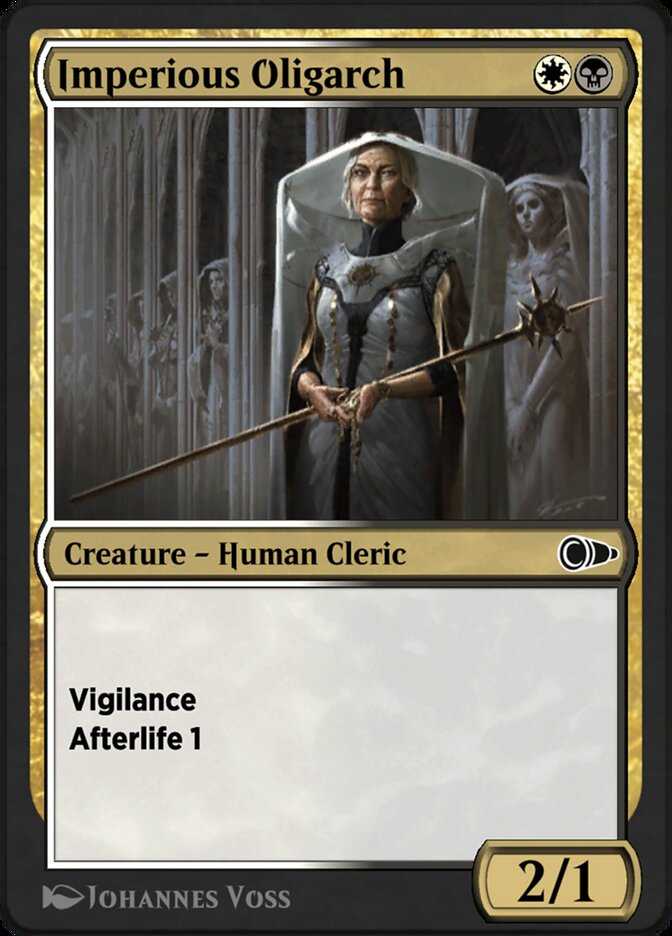
White/Black overall has a win rate of 53.53%, which is below the average. But looking at the top commons and uncommons, it seems like the deck has some potential.
Again we see Pilgrim's Eye showing up as the top common, being comparable to the best uncommon. As we will see it fits well with all the other 1/1 fliers this color combination can produce.
One of such producer cards is Imperious Oligarch, which happily trades with any other two-drop and leaves a 1/1 flier behind.
| Orzhov Commons | Win Rate |
|---|---|
| Pilgrim's Eye | 62.03% |
| Ob Nixilis's Cruelty | 61.63% |
| Imperious Oligarch | 60.95% |
| Undead Butler | 59.71% |
| Supernatural Stamina | 58.43% |
For the uncommons we see a 6 mana sorcery that creates three 1/1 fliers, Triplicate Spirits, as the best performing card. Having convoke however will allow you to play that card much earlier and swarm the bird with annoying to deal with spirit tokens.
Nighthowler is then a great way to transform one of those small fliers into a real threat.
| Orzhov Uncommons | Win Rate |
|---|---|
| Triplicate Spirits | 62.8% |
| Ultimate Price | 61.64% |
| Nighthowler | 61.44% |
| Cartel Aristocrat | 60.13% |
| Steward of Solidarity | 60.0% |
Undervalued and Overvalued Cards

Cartel Aristocrat is quite underrated with an ALSA of 7.19. While on first sight it doesn’t seem so impressive, the endless sac fodder this deck can produce can make it very hard to deal with and a perfect body to wear a bunch of auras. The protection ability is also making is very hard to block.
| Orzhov Undervalued | Win Rate | ALSA |
|---|---|---|
| Imperious Oligarch | 60.95% | 7.79 |
| Supernatural Stamina | 58.43% | 8.06 |
| Cartel Aristocrat | 60.13% | 7.19 |
| Nantuko Husk | 56.96% | 7.61 |
| Pilgrim's Eye | 62.03% | 5.83 |
Auras doesn't seem to be what makes Orzhov tick with Hero of Iroas having such a bad win rate.
Another card to avoid is Ghostblade Eidolon, which makes sense when most of your creatures are 1/1, double strike is not that impressive.
| Orzhov Overvalued | Win Rate | ALSA |
|---|---|---|
| Hero of Iroas | 49.28% | 4.45 |
| Ghostblade Eidolon | 44.98% | 6.11 |
| Stab Wound | 50.86% | 4.44 |
| Blood Scrivener | 50.54% | 5.56 |
| Evolving Wilds | 52.27% | 5.42 |
Secret Gold and Trap Cards
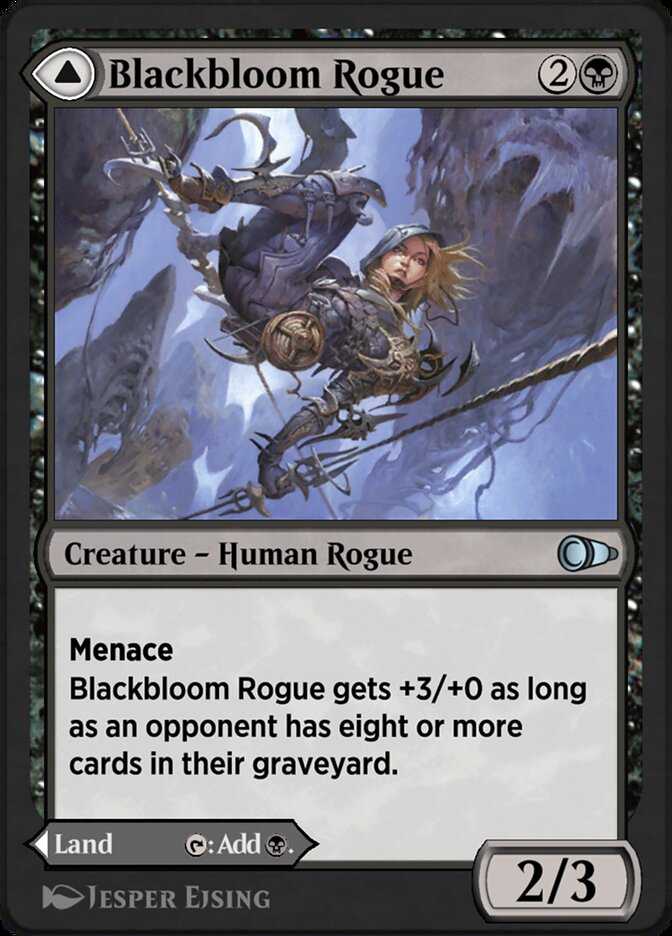
Blackbloom Rogue seems to have found a home here, which suggests to me that Orzhov plays very grindy games, where the rogue gets the power up from having enough cards in opponents graveyard.
Another card that is doing well in Orzhov is Celestial Archon, which is a great way to close out a stalled game.
| Secret Gold Cards | Win Rate | Orzhov Win Rate |
|---|---|---|
| Triplicate Spirits | 56.4% (0.37%) | 62.8% (7.97%) |
| Kabira Takedown | 54.97% (-1.05%) | 58.54% (3.71%) |
| Pilgrim's Eye | 57.52% (2.74%) | 62.03% (7.2%) |
| Blackbloom Rogue | 54.9% (0.25%) | 59.43% (4.61%) |
| Celestial Archon | 55.49% (-0.53%) | 58.62% (3.79%) |
As for traps, Gurmag Angler is showing up here. A vanilla 5/5 without any kind of evasion is not what you need, even when you get it for cheap.
| Trap Cards | Win Rate | Orzhov Win Rate |
|---|---|---|
| Hero of Iroas | 56.29% (0.27%) | 49.28% (-5.55%) |
| Gurmag Angler | 54.75% (0.09%) | 49.68% (-5.15%) |
| Ghostblade Eidolon | 51.08% (-4.95%) | 44.98% (-9.84%) |
| Devour Flesh | 54.4% (-0.26%) | 50.34% (-4.49%) |
| Blood Scrivener | 53.12% (-1.54%) | 50.54% (-4.28%) |
Golgari
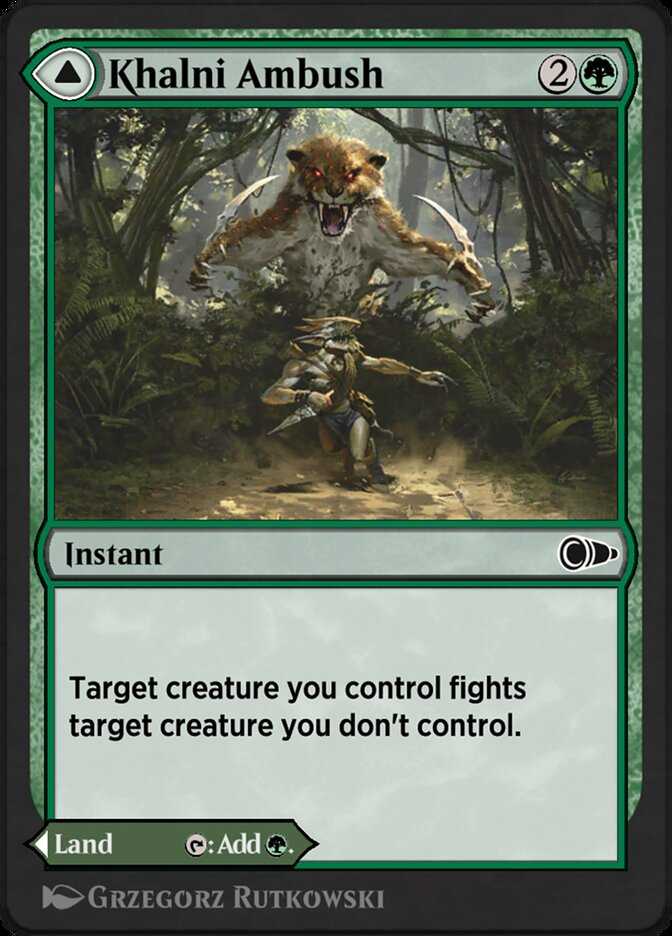
Black/Green is not doing so well which is already apparent when looking at the top commons. While Ob Nixilis's Cruelty is still a great removal spell, the other cards don't have impressive stats.
Khalni Ambush is the second best performing common, before Evolving Wilds, telling us very little about the archetype.
Only Undead Butler on place 5 is a card that actually does something for the decks strategy by self-milling and getting back creatures from the graveyard.
| Golgari Commons | Win Rate |
|---|---|
| Ob Nixilis's Cruelty | 61.92% |
| Khalni Ambush | 57.82% |
| Evolving Wilds | 56.88% |
| Savage Punch | 56.28% |
| Undead Butler | 56.17% |
In the uncommons table, we see generically strong green and black cards like Goreclaw, Terror of Qal Sisma, Clear Shot, and Ultimate Price. But also some Golgari specific cards like Kraul Harpooner and Dreadhound.
The theme seems to be to mill creature cards into the graveyard, yet we don’t see any enablers in the top cards so far. Might be that this is the bottleneck for the archetype.
| Golgari Uncommons | Win Rate |
|---|---|
| Goreclaw, Terror of Qal Sisma | 63.84% |
| Kraul Harpooner | 61.32% |
| Ultimate Price | 59.75% |
| Dreadhound | 58.7% |
| Clear Shot | 58.58% |
Undervalued and Overvalued Cards
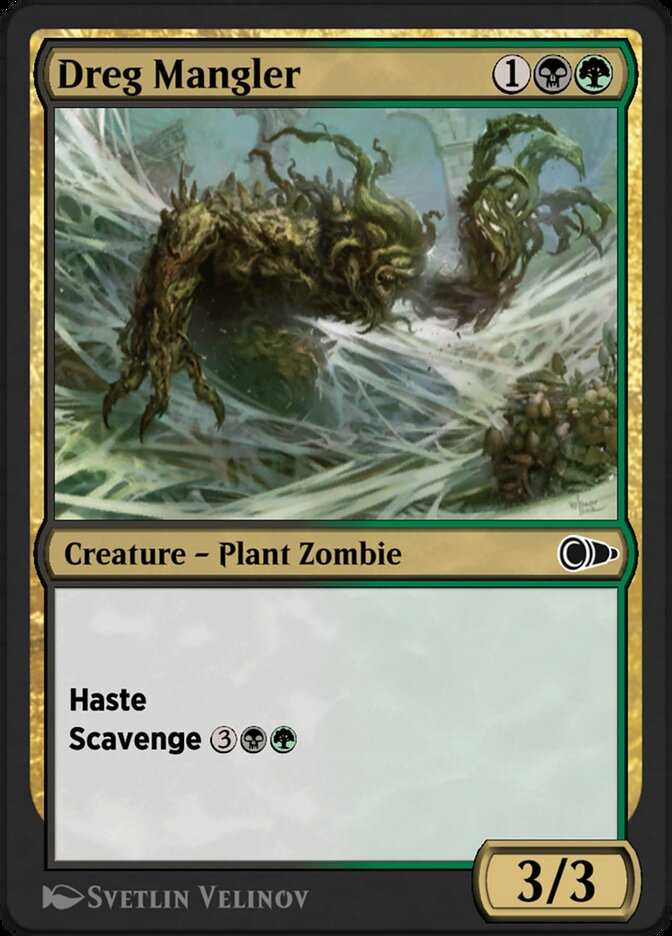
In the undervalued cards we see Dreg Mangler and Sanitarium Skeleton, both can be salvaged from the graveyard. However, their win rate is already on the verge of being average, so it might be that the archetype is just not that strong.
| Golgari Undervalued | Win Rate | ALSA |
|---|---|---|
| Dreg Mangler | 54.82% | 7.68 |
| Nantuko Husk | 54.88% | 7.61 |
| Supernatural Stamina | 53.47% | 8.06 |
| Sanitarium Skeleton | 54.59% | 7.67 |
| Pelakka Predation | 54.46% | 7.61 |
Surprisingly Honored Hydra is showing up as the most overvalued card in Golgari, as you might think that getting a 6/6 trampler discounted from the graveyard might be a great deal. However, the win rate is abysmal, which even makes it pop up as a trap in the later table.
| Golgari Overvalued | Win Rate | ALSA |
|---|---|---|
| Priest of the Blood Rite | 51.34% | 4.29 |
| Honored Hydra | 51.6% | 4.38 |
| Voyaging Satyr | 51.94% | 5.31 |
| Cruel Revival | 53.0% | 4.98 |
| Bala Ged Recovery | 51.65% | 5.57 |
Secret Gold and Trap Cards
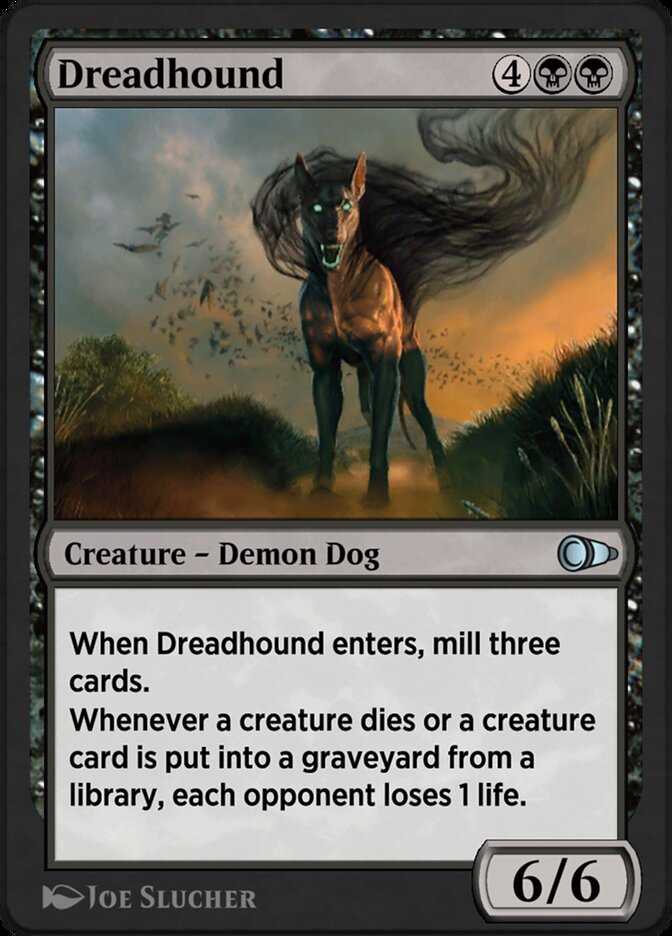
As secret gold card we see Dreadhound which is both a graveyard enabler and payoff in one card. It seems like ways to self-mill is the key to success in Golgari and that premium ways to do so are rare.
| Secret Gold Cards | Win Rate | Golgari Win Rate |
|---|---|---|
| Goreclaw, Terror of Qal Sisma | 56.35% (2.78%) | 63.84% (9.34%) |
| Dreadhound | 54.6% (-0.05%) | 58.7% (4.2%) |
| Khalni Ambush | 53.43% (-0.14%) | 57.82% (3.32%) |
| Kraul Harpooner | 57.1% (3.53%) | 61.32% (6.82%) |
| Evolving Wilds | 54.27% (-0.52%) | 56.88% (2.39%) |
That Bala Ged Recovery is showing up as a trap here might indicate that something is wrong here. Probably looking at non-splash data here is not helpful, as Golgari is probably a good shell for multicolored decks.
| Trap Cards | Win Rate | Golgari Win Rate |
|---|---|---|
| Honored Hydra | 55.09% (1.52%) | 51.6% (-2.9%) |
| Bala Ged Recovery | 54.51% (0.94%) | 51.65% (-2.85%) |
| Voyaging Satyr | 53.97% (0.39%) | 51.94% (-2.55%) |
| Gnarlback Rhino | 55.52% (1.94%) | 53.75% (-0.74%) |
| Cruel Revival | 55.56% (0.9%) | 53.0% (-1.49%) |
Conclusion
I’ll skip the overview of Simic for now, as the dataset for pure Blue/Green decks is too small to draw meaningful conclusions.
In general keep in mind that this article was only looking at pure two-color decks and by doing so ignores a huge chunk of what this format is about. It is however more complicated to break down multicolored decks with what data is currently available. So maybe, I’ll do a follow-up article on multicolor and more importantly the gates deck in the future once the public dataset is released.
As for the two-color decks presented here, I hope this was useful information and that it helps you to navigate the format better. Understanding which archetype wants which card is one of the most important level-ups you can make in a format and using data is a great way to speed up that discovery process. As a tip, keep this article open during your next draft to quickly look up which cards are good for the open colors you’re seeing.
If you have any questions or feedback, feel free to reach out to me on Bluesky.
